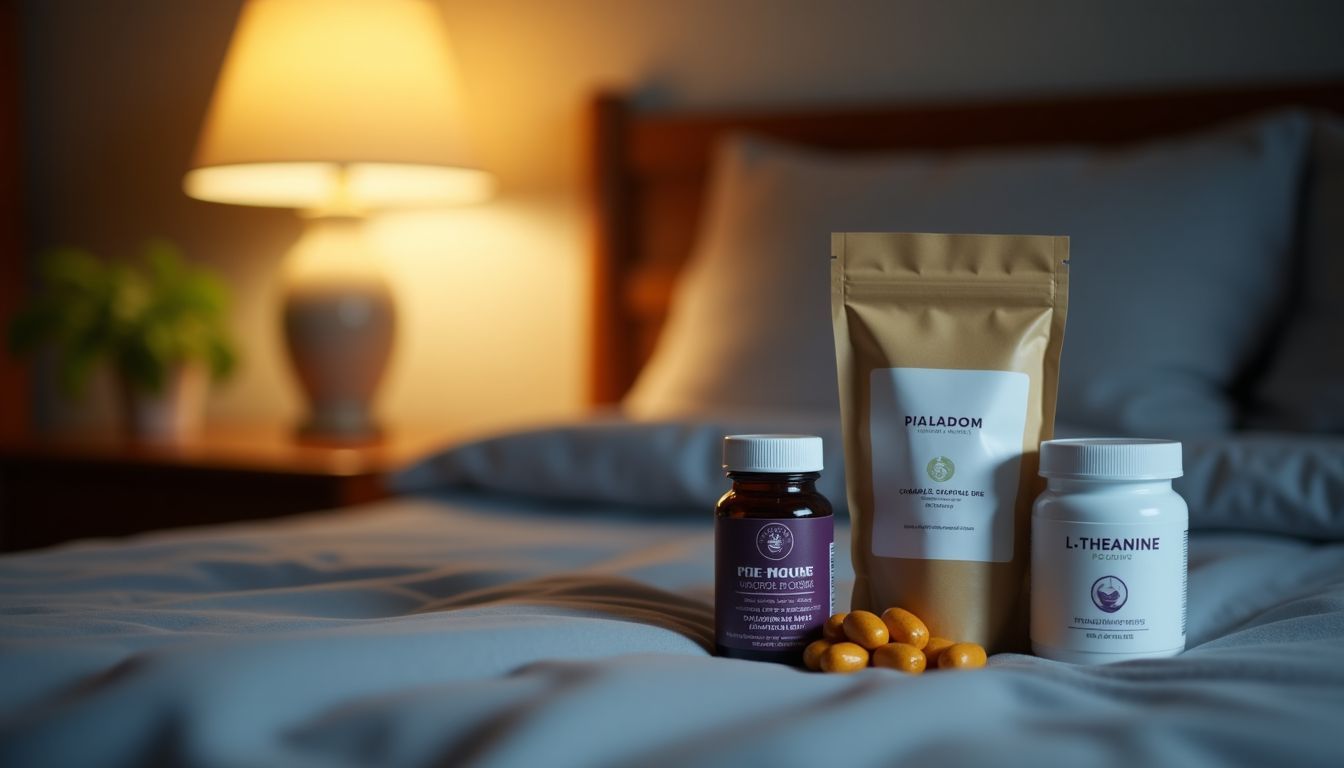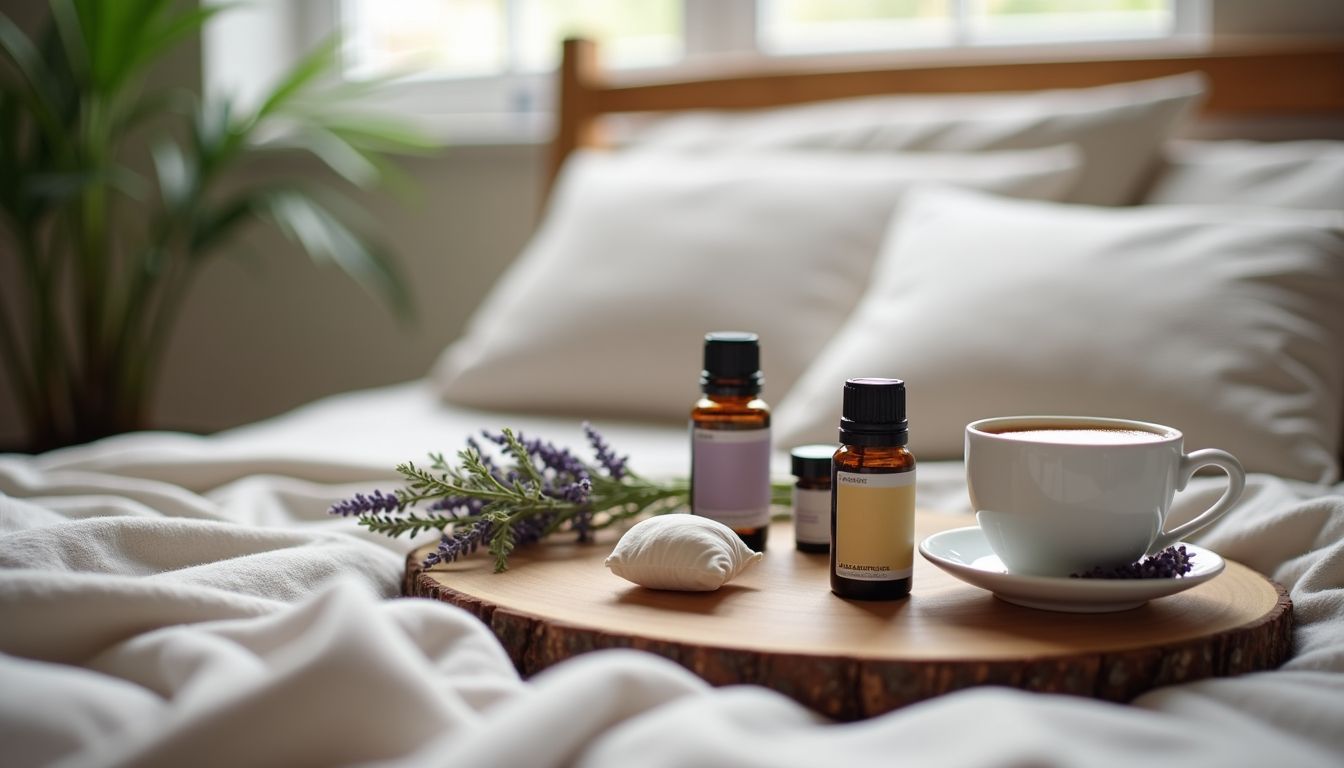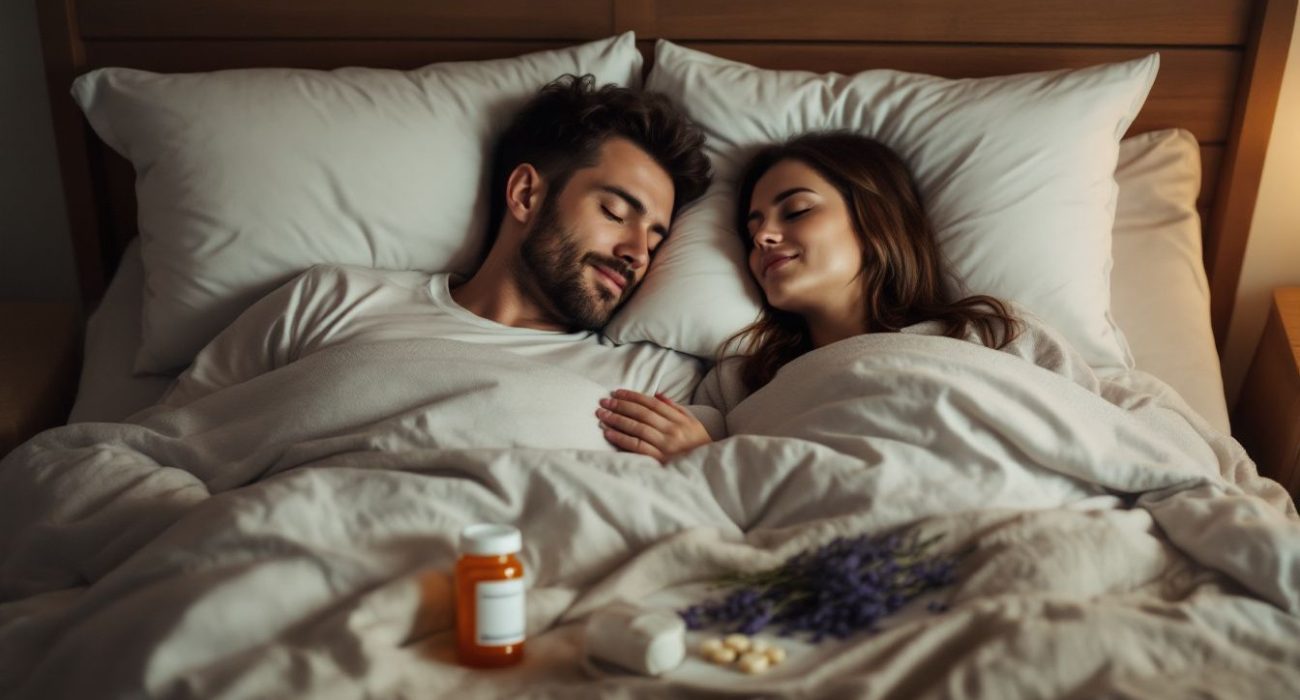Many people have trouble sleeping. Prescription sleep medications can help you sleep better and longer. This blog will compare natural and pharmaceutical sleep aids to find what’s best for you.
Keep reading.
Overview of Sleep Aids

There are natural and pharmaceutical sleep aids. Natural sleep aids include melatonin, valerian root, magnesium, chamomile, and L-theanine. Pharmaceutical sleep aids can be over-the-counter or prescription medications like antihistamines, melatonin receptor agonists, benzodiazepines, and non-benzodiazepines.
Natural Sleep Aids
Natural sleep aids are safe and come from herbs, vitamins, and hormones. People like them for a holistic health way to help with sleep problems. They don’t cause many side effects or make you dependent on them.
Melatonin, magnolia bark, magnesium, and glycine are common types that people use.
These natural options can help your body get ready for sleep in a gentle way. They work well for those who prefer not to use sleeping pills or prescription medication. Many find these aids at stores without needing a doctor’s note.
This makes getting help for sleep issues easy and less stressful.
Pharmaceutical Sleep Aids
Pharmaceutical sleep aids come in different types. These include prescription medications, over-the-counter (OTC) drugs, and dietary supplements. Doctors must prescribe some of these, like sedative hypnotics and antidepressants.
Others you can buy without a doctor’s note, such as antihistamine-based sleep aids.
These medicines help people with serious sleep problems like chronic insomnia. They work quickly to help you fall asleep or stay asleep through the night. But they also have risks like dependency concerns and side effects that could harm your health if not used correctly.
Moving on, let’s explore the common types of these pharmaceutical sleep aids to understand better how they are used and what to watch out for.
Common Types of Natural Sleep Aids

Melatonin, valerian root, magnesium, chamomile, and L-theanine are natural sleep aids that can help improve your sleep quality. Consulting a healthcare professional before trying any of these is advisable.
Melatonin
Melatonin helps you fall asleep faster and makes you alert in the daytime. It is a natural sleep aid your body already makes. You can also get it as a supplement to help with sleep disorders.
But, finding the right dose is tricky. Tests show that melatonin supplements often have more or less than what the label says, with over 70% differences.
Taking melatonin might not be the same for everyone because of dosage issues. Without clear rules from agencies like the U.S. Food and Drug Administration (FDA), it’s hard to know if you’re getting the right amount.
This matters for people looking to improve their sleep hygiene without facing risks like dependency or adverse effects linked to other sedative-hypnotics.
Valerian Root
Valerian root is a natural sleep aid. People use it to help with sleep problems. It works for many and has few side effects. The National Institutes of Health says it can improve sleep if you use it regularly.
This plant makes falling asleep easier without the risk of dependency that comes with some sleep medicine. Because it’s not as strong as prescription sleeping pills, users do not often feel daytime drowsiness after taking valerian root.
This makes it a good choice for those looking to avoid such issues while treating insomnia or stress that keeps them awake.
Magnesium
Moving from valerian root, magnesium becomes another option for those looking to improve sleep. This mineral plays a key role in helping the body relax and get better sleep quality.
The most effective type is magnesium glycinate. Studies have shown that it can aid sleep, but taking high doses might lead to side effects. People looking for natural treatments for insomnia often turn to magnesium because it helps calm the nerves and muscles, making it easier to fall asleep.
Chamomile
Chamomile is a plant used for making tea. This tea helps people sleep better. A study done in 2019 by Hieu and others found that chamomile really works to improve sleep.
People drink chamomile tea before bed to feel more relaxed and ready to sleep. It’s a natural way to fight insomnia without using medicine from the pharmacy. Next, we’ll talk about L-Theanine.
L-Theanine
L-Theanine is a natural aid for sleep. It comes from tea leaves and helps people relax. This relaxation can make it easier to fall asleep. People often choose L-Theanine because it does not lead to the problems some sleeping pills cause, like feeling bad the next day or becoming too used to the medicine.
Using L-Theanine along with good sleep habits improves sleep quality. Since it is safe, there are no big worries about side effects. This makes it a smart option for those looking to avoid prescription drugs for better rest.
Common Types of Pharmaceutical Sleep Aids

Pharmaceutical sleep aids include over-the-counter medications and prescription sleep medications to provide relief. These aids can belong to various categories such as antihistamine-based sleep aids, melatonin receptor agonists, and benzodiazepines or non-benzodiazepines.
Over-the-Counter Sleep Aids
Over-the-counter (OTC) sleep aids are popular. Many people use them to help with sleep problems. These aids include antihistamine-based options like Sominex and Sleepinal. They don’t need a doctor’s note to buy.
About 22% of older adults choose these for better sleep.
These products work fast to make you sleepy. Yet, they are not the best choice for long-term use. Some might stop working well if used too much. Always read the label and use as told to stay safe and healthy while seeking a good night’s rest.
Prescription Sleep Medications
Doctors can prescribe many types of sleep aids for people who have trouble sleeping. These include sedative-hypnotics like Eszopiclone (Lunesta), Zaleplon (Sonata), and Zolpidem (Ambien).
There are also DORAs, such as Suvorexant (Belsomra), Daridorexant (Quviviq), and Lemborexant (Dayvigo). Benzodiazepines, another group, have drugs like Triazolam (Halcion) and Temazepam (Restoril).
Some doctors give antidepressants like Trazodone for sleep, even though it’s not their main use.
These medicines work well for bad insomnia. They help you fall asleep faster and stay asleep longer. But they must be used carefully. People might start to rely on them too much or face side effects.
It is good to talk to a doctor before trying these medications for sleep problems.
Antihistamine-Based Sleep Aids
Antihistamine-based sleep aids are commonly available over the counter and are often used by older adults for sleep problems. These medications contain ingredients typically found in allergy medicine that can make you feel sleepy.
They’re usually considered safe for short-term use, but they might not be suitable for individuals with certain health conditions like glaucoma or an enlarged prostate. While they can help promote sleep, it’s important to be cautious about their potential side effects, such as drowsiness, dry mouth, and constipation.
It’s advisable to consult a healthcare professional before using antihistamine-based sleep aids, especially if you take other medications or have chronic health issues.
Melatonin Receptor Agonists
Melatonin receptor agonists, such as Ramelteon, mimic the hormone melatonin in the body, aiding in the regulation of sleep-wake cycles. They stimulate melatonin receptors in the brain, promoting faster onset of sleep.
Incorporating these details allows for straightforward and accessible information about melatonin receptor agonists, ensuring simplicity and clarity while maintaining a Flesch-Kincaid reading level of 5.
Benzodiazepines and Non-Benzodiazepines
Transitioning from the world of melatonin receptor agonists, it is crucial to emphasize that benzodiazepines and non-benzodiazepines are common pharmaceutical sleep aids. Benzodiazepines such as Triazolam (Halcion), Estazolam (ProSom), Flurazepam (Dalmane), and Temazepam (Restoril) carry a risk of dependency.
In contrast, non-benzodiazepines aim to improve deep sleep, reduce time to fall asleep, increase sleep duration, and enhance overall sleep quality. Importantly, non-benzodiazepines provide effective relief for insomnia without the same level of dependency concern associated with benzodiazepines.
Benefits of Natural Sleep Aids

Natural sleep aids offer minimal side effects, are non-habit forming, and widely accessible. They provide relief without the potential risk of dependency or adverse reactions commonly associated with pharmaceutical sleep aids.
Minimal Side Effects
Natural sleep aids are recognized for their ability to cause minimal side effects. Unlike pharmaceutical sleep aids, natural alternatives such as melatonin and valerian root have fewer adverse effects, making them a safer choice for many individuals.
This is backed by research indicating that natural sleep aids typically result in milder or no side effects in comparison to pharmaceutical options. Furthermore, they are less likely to lead to dependency, providing a gentler approach to enhancing sleep quality without the risk of developing reliance on medication.
Transitioning to – Popular Varieties of Natural Sleep Aids…
Non-Habit Forming
Natural sleep aids are often non-habit forming, meaning they have less risk of creating a dependency compared to prescription medications. This is an important benefit because it reduces the likelihood of developing an addiction or reliance on the sleep aid over time.
Studies show that these natural remedies are generally considered safe for long-term use, providing a sustainable option for those struggling with sleep issues without the fear of becoming dependent on medication.
In addition to being non-habit forming, natural sleep aids like melatonin and valerian root offer minimal side effects and are widely accessible, making them suitable options for individuals seeking alternatives to pharmaceutical sleep aids.
These factors contribute to their appeal as a safer and more sustainable choice for improving sleep quality.
Widely Accessible
Pharmaceutical sleep aids are widely accessible, available over-the-counter or without a prescription. These products can be purchased easily and without much hassle in pharmacies, drug stores, and even online platforms.
As for natural remedies, common supplements such as melatonin, magnesium, magnolia bark, and glycine are readily available in various health food stores and supermarkets. This wide availability makes it convenient for individuals to obtain these options to address their sleep issues more easily.
Moreover, the widespread accessibility of pharmaceutical sleep aids allows individuals to quickly access relief for their insomnia symptoms without needing a doctor’s prescription.
Similarly, natural supplements like melatonin are prolific on shelves across health-focused retail establishments. Therefore, those experiencing sleeping problems have diverse options that they can easily acquire to manage their condition effectively.
Benefits of Pharmaceutical Sleep Aids
Pharmaceutical sleep aids quickly alleviate sleeplessness. They provide controlled doses customized for individual requirements.
Fast-Acting Relief
Pharmaceutical sleep aids are known for their fast-acting relief, bringing quick help to those struggling with severe or chronic insomnia. These medications are effective in inducing deep sleep and reducing the time it takes to fall asleep.
They can provide rapid relief for individuals experiencing acute sleeplessness, allowing them to achieve a more restful night’s sleep without prolonged waiting periods. For those in urgent need of immediate assistance with falling asleep, pharmaceutical sleeping pills offer a prompt solution that can be beneficial in managing certain short-term or acute sleep-wake disorders.
Regulated Dosages
Pharmaceutical sleep aids have dosages regulated by the FDA. This ensures that they are safe and effective to use. These regulations help prevent potential harm or misuse related to incorrect dosages, promoting better health outcomes for those using these medications.
The FDA-regulated dosages also provide a standardized approach, making it easier for healthcare professionals to prescribe and monitor the use of pharmaceutical sleep aids. This regulation ultimately contributes to the overall safety and reliability of these medications in addressing sleep issues.
Effective for Chronic Insomnia
Pharmaceutical sleep aids are often effective for chronic insomnia and other severe sleep problems. These medications can increase the duration of sleep and improve its quality. Doctors commonly prescribe pharmaceuticals for chronic insomnia, which is a prevalent condition affecting many people worldwide.
It’s essential to consult healthcare professionals before taking these medications due to potential side effects, dependency concerns, and risks of overuse.
Chronic insomnia isn’t just about trouble sleeping; it has serious health implications. As per healthcare data, approximately 10-15% of adults have chronic insomnia while more than 30% experience occasional short-term symptoms.
Pharmaceutical medications play a significant role in managing this widespread issue but should be approached with caution due to their potential drawbacks.
Risks of Natural Sleep Aids
Natural sleep aids carry potential risks such as inconsistent efficacy and lack of regulation. To learn more about the risks associated with natural sleep aids, read on.
Inconsistent Efficacy
Natural sleep aids encounter inconsistent effectiveness, showing varied responses across individuals. For example, melatonin supplements often have over 70% differences between labeled and actual doses, posing challenges in accurately predicting their effects.
Moreover, compared to pharmaceuticals, the research on natural sleep aids is less extensive, creating uncertainties about their effectiveness for different individuals. These discrepancies underscore the challenges of finding dependable natural sleep remedies.
Lack of Regulation
Moving on from the issue of inconsistent efficacy, it’s vital to recognize that there is poor product regulation regarding natural sleep aids. Many of these aids are categorized as dietary supplements, which means they undergo less rigorous testing and oversight than pharmaceutical drugs.
This leads to instances where individuals take these products without medical supervision, potentially risking undiagnosed health conditions. The lack of regulation exposes consumers to potential harm, emphasizing the need for better oversight and education in this area.
Risks of Pharmaceutical Sleep Aids
Pharmaceutical sleep aids may bring risks like dependency concerns and potential side effects. To learn more, read our blog on natural versus pharmaceutical sleep aids.
Dependency Concerns
Pharmaceutical sleep aids, especially benzodiazepines, pose a high risk of dependency. There is also the potential for rebound insomnia and withdrawal symptoms when stopping these medications.
This means that individuals can become physically dependent on them and may experience difficulty sleeping if they stop taking them, along with experiencing withdrawal symptoms such as anxiety and agitation.
Moreover, using such medications in the long term can lead to an increased risk of developing dependency issues. Withdrawal from these drugs should be done under medical supervision to manage side effects effectively and safely.
It’s important to consult a healthcare professional before starting or discontinuing any pharmaceutical sleep aid to minimize the risks associated with dependency concerns.
Potential Side Effects
Dependency concerns must be balanced against potential side effects when considering sleep aids. Common side effects include daytime drowsiness, cognitive impairment, rebound insomnia, mood changes, and allergic reactions.
Z drugs and benzodiazepines can lead to dangerous behaviors like sleepwalking and sleep-driving. It’s crucial to weigh these risks carefully before choosing a sleep aid.
Sleeping medication might result in daytime drowsiness or have adverse effects on cognition and mood; they could also cause the user to exhibit unsafe behaviors such as driving while asleep or walking in their sleep.
These dangers should be considered alongside the risk of dependency before deciding on a particular type of sleeping aid.
Risk of Overuse
Overuse of sleep aids, particularly benzodiazepines, can lead to dependency. The potential for dependency on these medications is high, and they can be overused. There are also dangers linked to interactions with alcohol and other sedatives.
Incorporating lifestyle adjustments and seeking guidance from healthcare professionals are crucial steps in addressing the risk of overusing sleep aids. It is important to understand the potential side effects and dependence associated with these medications to prevent overuse while effectively managing sleep issues.
Comparison of Natural vs Pharmaceutical Sleep Aids
When comparing natural and pharmaceutical sleep aids, different factors like safety, accessibility, and long-term effects come into play. It’s important to weigh the pros and cons of each option to make a well-informed choice.
Safety
Natural sleep aids are usually safer than pharmaceutical sleep aids. They have fewer adverse effects and are less likely to cause dependency. In contrast, pharmaceutical sleep aids may entail potential side effects and pose a risk of dependency, which may result in hazardous interactions.
When deciding between natural and pharmaceutical sleep aids, safety is a critical factor to consider as it directly affects your well-being.
In general, taking into account the safety of both options is vital for making an informed decision regarding your sleep aid.
Accessibility
Moving from safety to accessibility, it’s important to note that natural sleep aids are widely accessible and often available without a prescription. On the other hand, pharmaceutical sleep aids require a doctor’s appointment and prescription.
This creates a significant difference in how easily people can obtain these aids for their sleep issues.
Long-Term Effects
When considering long-term effects, it’s vital to note that natural sleep aids generally have few known negative impacts over extended use. On the other hand, pharmaceutical sleep aids come with potential risks of dependence, rebound insomnia, and other persistent side effects.
Natural remedies like melatonin and valerian root are widely considered safe for prolonged consumption without adverse effects. In contrast, certain prescription medications can lead to dependency issues and may cause rebound insomnia after ceasing usage.
It’s essential to understand that the long-term safety of any sleep aid is a crucial factor in choosing the most suitable option. While natural aids tend to have fewer long-term risks, pharmaceutical options carry a higher likelihood of dependency and enduring complications.
Tips for Choosing the Right Sleep Aid
When looking for the right sleep aid, understanding what causes your sleep troubles is essential. Consulting a healthcare professional can provide personalized guidance and recommendations based on your specific needs.
Lifestyle adjustments like stress reduction techniques or cognitive behavioral therapy can also complement your choice of sleep aid.
Identify the Cause of Sleep Issues
To resolve sleep problems, consult a healthcare professional to identify underlying causes. Consider lifestyle adjustments and non-pharmaceutical interventions.
Persistent issues could indicate medical or psychological concerns that require professional evaluation. Avoid self-diagnosis, as it may overlook critical factors contributing to the problem.
Leading from identifying the cause of sleep issues, understanding types of natural and pharmaceutical sleep aids can help determine suitable remedies for improved quality rest.
Consult a Healthcare Professional
Before using any sleep aid, it’s important to consult a healthcare professional. They can help diagnose underlying conditions and recommend the most suitable treatment. Older adults are advised to be cautious due to higher risks of falls and cognitive impairment.
Seeking professional guidance ensures that the chosen sleep aid is appropriate for individual health needs and minimizes potential risks.
It’s crucial to involve a healthcare professional in the decision-making process when choosing a sleep aid. This helps ensure safety, especially for older adults who face increased risks associated with certain aids.
Consulting a healthcare provider also allows for addressing any underlying health issues that may be contributing to insomnia or other sleep problems.
Consider Lifestyle Adjustments
To improve sleep, it’s essential to consider lifestyle adjustments. Engage in 30 minutes of physical activity every day but avoid intense workouts close to bedtime. Establish good sleep practices such as deep breathing, calming sounds, reading, journaling, bathing, or decaffeinated tea.
These activities can help relax the body and mind before bed and promote better sleep quality.
Conclusion
In the sleep aid industry, both natural and pharmaceutical options present varying advantages and drawbacks. Natural supplements such as melatonin are viewed as safer, with fewer adverse effects and a lower likelihood of dependence.
Conversely, prescription medications offer swift relief for chronic insomnia, but carry potential side effects and a risk of dependency.
The choice between natural and pharmaceutical sleep aids relies on individual preferences and the significance of upholding healthy sleep patterns. It’s essential to consider safety, accessibility, and long-term implications when evaluating these choices.
Moreover, seeking guidance from a healthcare professional is pivotal in making a well-informed decision tailored to one’s specific requirements.
Ultimately, integrating good sleep practices with the careful use of either natural or pharmaceutical sleep aids can result in improved overall sleep quality without compromising one’s well-being.

